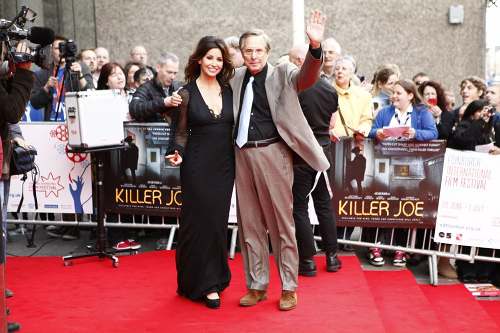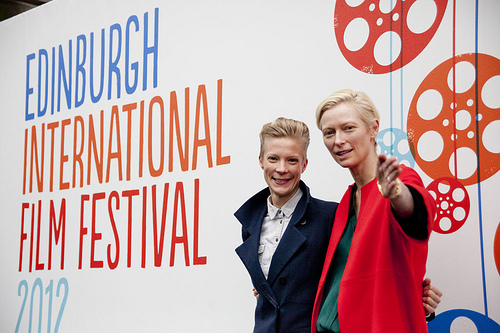 Back to selection
Back to selection
EIFF 2012: NEW BEGINNINGS

 Walking around the opening party you couldn’t help but hear the word “rebirth” a lot. As the most heavily pregnant person in the room, this made me jump, but I soon joined in the celebration. The 66th Edinburgh International Film Festival had just opened with William Friedkin‘s Killer Joe, and the evening was a definite success. Not everyone liked the film — there were questions about on-screen violence towards women in particular — but everyone agreed that as an opener, new festival director Chris Fujiwara had hit the right note. Smacked it right on the kisser, you might say. There was glamour, Hollywood royalty (Friedkin had been asked to sign an autograph book outside the cinema which had ‘Stars of the Past’ written on its cover, which he found very funny) and a party which had people discussing politics, sexism and cinema with a capital “C.”
Walking around the opening party you couldn’t help but hear the word “rebirth” a lot. As the most heavily pregnant person in the room, this made me jump, but I soon joined in the celebration. The 66th Edinburgh International Film Festival had just opened with William Friedkin‘s Killer Joe, and the evening was a definite success. Not everyone liked the film — there were questions about on-screen violence towards women in particular — but everyone agreed that as an opener, new festival director Chris Fujiwara had hit the right note. Smacked it right on the kisser, you might say. There was glamour, Hollywood royalty (Friedkin had been asked to sign an autograph book outside the cinema which had ‘Stars of the Past’ written on its cover, which he found very funny) and a party which had people discussing politics, sexism and cinema with a capital “C.”
Fujiwara introduced Killer Joe as a “great film” by a filmmaker which a particular artistic vision. This, he claimed, was what Edinburgh was all about. Cinephilia certainly seems to be back in style this year. The delegate centre is hosting events every night, and the first night had Mark Cousins, ex-director of the EIFF and director of the epic The Story of Film, talking about Scottish nationalism, getting naked and PJ Harvey, but mostly films, filmmakers and film stars. (Cousins is also premiering his new film, What Is This Film Called Love? at this year’s festival). For the record, he’s a big fan of Shirley MacLaine but not so much Audrey Hepburn.
Cousins was also keen to recommend we all try out the Philippine New Wave strand, which has been attracting lots of excitement with the Edinburgh audience. Mondomanila, or: How I Fixed My Hair After A Rather Long Journey was certainly a ride — musical numbers, dwarf-twin-lesbian sex scenes and blood splattering violence set in the Manila slums. Its hero was a teenage boy who wore a T-shirt saying “Baby Jesus,” something which I’m sure is that much more outrageous for a home audience, where the vast majority of the population are Roman Catholic.
Apart from the competitive sections, and the strands defined by country, Fujiwara has pretty much done away with categorizing films this year. There are no Gala films, no Documentary section and no First Feature category. I have been very excited by this democratising of cinema, but met a documentary filmmaker who felt that it meant there was no supportive context for films which need that in order to be properly viewed and understood. Someone else pointed out that it’s just tricky in some cases to work out whether a film is a fiction or documentary piece by the notes in the programme, and that was frustrating. Perhaps we’ve been asked to go a little too far this year — after all, we don’t watch films cold, so should an audience have to work so hard to put together a lineup of films they are likely to find easier to enjoy?
The good news is that documentaries aren’t going to have any problems finding audiences this year. Bart Layton‘s The Imposter is already a firm audience favourite. Who can resist the story of an adult con artist who pretends to be a missing teenager and is welcomed into the home by the boy’s family as their son? Chilean documentary The Lifeguard is also getting lots of chat. And in a country where football (“soccer”) is a national obsession, Alexandre O. Philippe‘s follow up to The People vs. George Lucas‘ — The Life and Times of Paul the Psychic Octopus, which tells the story of the underwater football pundit who predicted the winners of the 2010 World Cup with 100% success — is essential viewing.

Future My Love — the debut feature of Edinburgh College of Art student Maja Borg, which took over 5 years to complete — has had one of the starriest world premieres a documentary could hope to receive, thanks to EIFF Patron Tilda Swinton gracing the red carpet. Everyone loves this beautiful, poetic, important movie, and it seems likely to be one of the films that 2012 will be remembered for. It is eligible for the prestigious Michael Powell Award for Best New British Feature; this year is the first time that documentaries have been included in the short list. It’s up against some stiff competition though, not least from another documentary, One Mile Away by Penny Woolcock. This film is an extraordinary document of an attempt by two members of opposing gangs in Birmingham to put an end to the violence that’s tearing up their city. Both the film and the actions of the men came about as a result of one man seeing one of Woolcock’s films and asking her to facilitate contact with an actor in Woolcock’s narrative feature One Day, who he knew was a member of the enemy gang. One Mile Away demonstrates another aspect of the power of cinema, the relationship between films and life that is celebrated in more intellectual ways in other parts of the programme.
When at festivals, filmmakers do tend to talk about making films. A LOT. This week a recurring theme in conversations is how you find your way to the filmmaking method that suits you. Nathan Silver, the director of Exit Elena, told me about how he started his filmmaking career using traditional methods — a script, a crew, production etc. — but found that he wasn’t getting what he wanted. And so he started again. He went to his family and friends, and made a film with them as co-writers and stars. What he manages to leave unsaid in every scene is what pushes the story forward — an amazing achievement for an improvised film. There’s masses of talent behind the camera on Exit Elena and you can’t help but celebrate Silver’s determination to find a method that works for him.
I also met a British filmmaker who was in town for a development scheme taking place at the festival. The day before, she finished a year of filming herself standing on the beach at the same time every day, staring into the camera. Like Silver, Sam Firth had also studied screenwriting, but frustrated with the traditional process, decided that she would be happier “making films” rather than planning to make them. So she’s found a way to do that. (More about that project here). The scheme paired her with mentor Clio Barnard, whose extraordinary documentary The Arbor is one of the most exciting British films we’ve seen in years — and when you hear that kind of open-minded development is going on at the EIFF, you start to understand that their commitment to new talent goes beyond showing films.
Fujiwara has said that listening to the views of the audiences and the public are as important to him this year as the programme. He too is clearly on a journey to find the best way to make EIFF work. He’s made some bold choices this year, and people are talking. Not just about the films, but about the festival, and what they want from it and for it. As the longest continually running festival in the world, EIFF has obviously evolved, but even after only a few days up and running, you can’t help but think it’s at the beginning of another new era.
